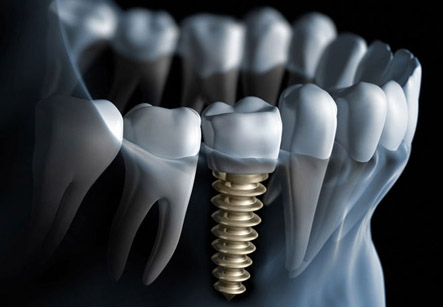Dental Implants
Introduction
Teeth may be lost due to various reasons including accidents, injury, infections, decay, old age etc. Some treatment alternatives in these patients include dentures, dental bridges or dental implants. Dental implants are prosthetic teeth that replace the roots of the missing teeth.
These can provide a strong foundation that is fixed permanently or firmly to the gums and are made to match the natural teeth.
Dental implants may be used for improving cosmetic appearance of the smile of the face. They also improve speech, comfort, and chewing capacity. Using dental implants also are hassle free when compared to the regular cleaning and removal-insertion regimens of dentures. They are more durable and convenient for the patient.
Procedure Details
Dental implants may be advised to patients who have healthy gums and strong surrounding bones to hold the implant. Those with poor oral hygiene, heavy smoking or drinking habits, with diabetes or heart disease may need counseling and correction before the commencement of this procedure.
It is usually done under local anesthesia when the operative area is numbed using an injection or spray.
Iran offers a superior Dental treatments that is world best quality. For patients from the USA, and Europe for example, the savings can be 60% or more

Before any implant is chosen the teeth and their alignment is studied. X rays investigation of the jaw and the gap between the teeth may be needed.
The size of the implant and the position of the operative site need to be demarcated before the operation.
The procedure is usually done under local anesthesia when the operative area is numbed using an injection or spray.
The dental implant as such is a tiny post made up of titanium. It is placed in a socket created in the jaw bone at the site of the missing tooth. The socket is created in a predetermined place. It is of a predetermined size to hold the post accurately.
Once the tissues around the socket start healing they heal all around the titanium post. Healing may take around 6 to 12 weeks.
Thereafter a small post is attached to this existing post. This new connecting post is called the abutment. It is the abutment that holds the artificial tooth in place. The new prosthetic tooth is created using a mould of the existing teeth and some visits may be needed to the dentist’s office to achieve a fit of the new tooth.
Recuperation and post operative complications
The procedure is mostly painless. However pain relievers are prescribed in case of post operative pain. Some visits to the dentists office to look at the fit, bite capacity, alignment and resolving other complications may be needed. Some complications of dental implants include infections, inflammations etc. of the socket and poor healing of the operative site. This is especially common in patients who have diabetes.
High blood sugar in these patients may delay the healing process or may raise the risk of infections.
Most dental implants have a high success rate and long life with adequate care and post operative follow up. They may last a life time in many patients. Regular oral care including brushing, flossing and check ups can protect the dental implants.